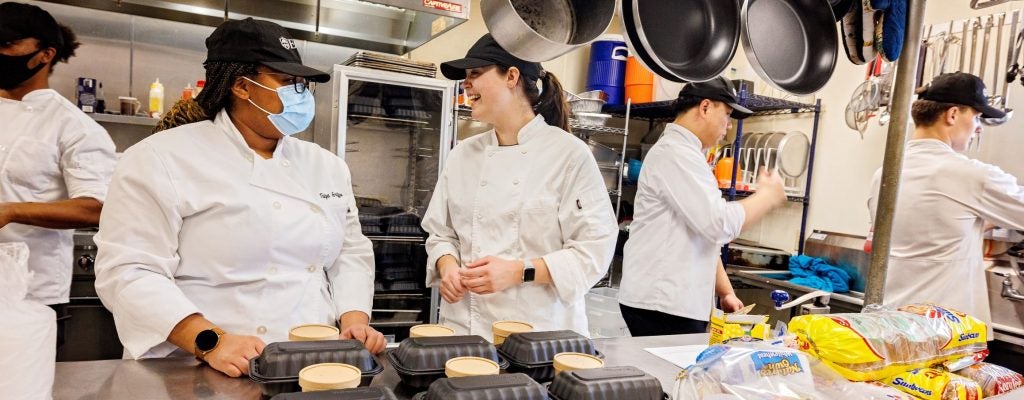April 1, 2022
SHL works with community soup kitchen
Traditionally, the School of Hospitality Leadership’s luncheon series was a tough ticket to find on East Carolina University’s campus. The series, typically held during both the fall and spring terms, involved student-led lunches where everything from the menu to the plates and the service were managed and delivered to seated customers by students taking the senior food preparation class and labs.
COVID-19 forced the food preparation course and lab to go virtual in 2020. Tutelage that took place in the Quantity Food Lab and Darden Dining Room was adapted for online course delivery. Last year, the luncheon’s table service shifted to a buffet lunch. Today, the words typical and traditional don’t come anywhere close to describing the conditions in which those classes and labs are delivered.
“The shifts this class is seeing represent what we’re seeing when it comes to the needs of our learners and what we are seeing from industry practitioners,” said Dr. Bob O’Halloran, director, ECU’s School of Hospitality Leadership.
For the spring ’22 term, the class adapted to a growing demand for engagement projects with the community by working with the Joy Soup Kitchen. Five students prepared 100 lunches for the community over three days. No matter the location, the objectives are the same.
Students must develop the menu by considering guests’ needs, kitchen layout and equipment, budget, presentation and packaging, and employee scheduling. Each lunch has a different management team. There is a high level of service and guest interaction for the luncheons with plated meals. With the Joy Soup Kitchen, students functioned in a catered environment, with all preparation taking place at the kitchen’s facilities and not at ECU.
“Working with the Joy Soup Kitchen allowed the students to cook on a quantity scale and to plan as if doing off-site catering,” said Jacqueline De Chabert-Rios, teaching assistant professor, School of Hospitality Leadership. “For our events and food service students, understanding the complexities of offering food at a different site is a great learning experience.”
De Chabert-Rios says the students who do take the food preparation class virtually tend to work with organizations such as the Joy Soup Kitchen and the Ronald McDonald House.
“The needs of our learners are changing,” adds O’Halloran. “Some want the face-to-face option, and some want the virtual opportunity because it works better with their schedules. Our food preparation course allows for any learners to be more adaptable.”
- Categories:
- School of Hospitality Leadership

